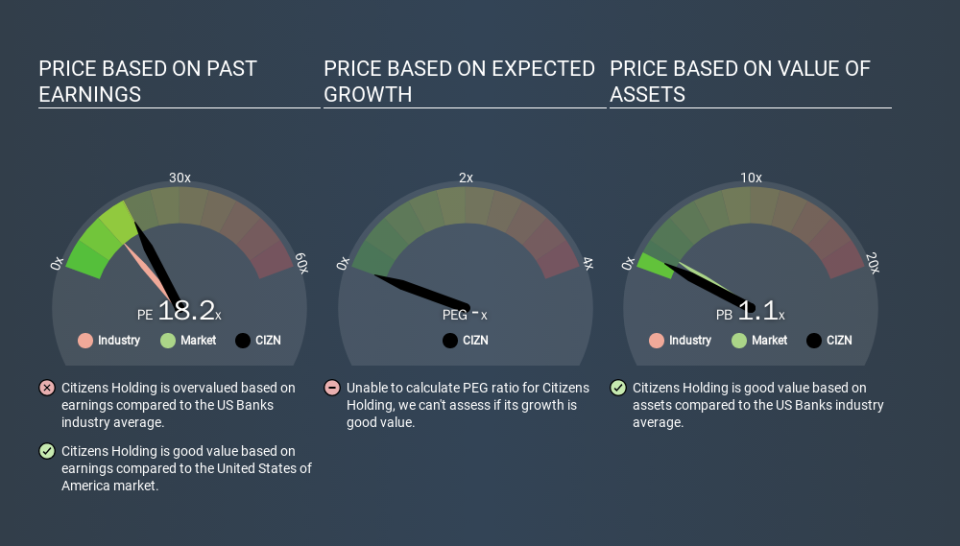Is Citizens Holding Company's (NASDAQ:CIZN) P/E Ratio Really That Good?

To the annoyance of some shareholders, Citizens Holding (NASDAQ:CIZN) shares are down a considerable in the last month. Zooming out, the recent drop wiped out a year's worth of gains, with the share price now back where it was a year ago.
All else being equal, a sharp share price increase should make a stock less attractive to potential investors. While the market sentiment towards a stock is very changeable, in the long run, the share price will tend to move in the same direction as earnings per share. So some would prefer to hold off buying when there is a lot of optimism towards a stock. One way to gauge market expectations of a stock is to look at its Price to Earnings Ratio (PE Ratio). A high P/E ratio means that investors have a high expectation about future growth, while a low P/E ratio means they have low expectations about future growth.
Check out our latest analysis for Citizens Holding
Does Citizens Holding Have A Relatively High Or Low P/E For Its Industry?
Citizens Holding's P/E of 18.24 indicates some degree of optimism towards the stock. The image below shows that Citizens Holding has a higher P/E than the average (12.6) P/E for companies in the banks industry.
Its relatively high P/E ratio indicates that Citizens Holding shareholders think it will perform better than other companies in its industry classification. Shareholders are clearly optimistic, but the future is always uncertain. So investors should always consider the P/E ratio alongside other factors, such as whether company directors have been buying shares.
How Growth Rates Impact P/E Ratios
Companies that shrink earnings per share quickly will rapidly decrease the 'E' in the equation. That means even if the current P/E is low, it will increase over time if the share price stays flat. A higher P/E should indicate the stock is expensive relative to others -- and that may encourage shareholders to sell.
Citizens Holding shrunk earnings per share by 15% over the last year. And it has shrunk its earnings per share by 5.3% per year over the last five years. This growth rate might warrant a below average P/E ratio.
Don't Forget: The P/E Does Not Account For Debt or Bank Deposits
One drawback of using a P/E ratio is that it considers market capitalization, but not the balance sheet. That means it doesn't take debt or cash into account. The exact same company would hypothetically deserve a higher P/E ratio if it had a strong balance sheet, than if it had a weak one with lots of debt, because a cashed up company can spend on growth.
While growth expenditure doesn't always pay off, the point is that it is a good option to have; but one that the P/E ratio ignores.
Citizens Holding's Balance Sheet
Net debt totals 52% of Citizens Holding's market cap. This is enough debt that you'd have to make some adjustments before using the P/E ratio to compare it to a company with net cash.
The Bottom Line On Citizens Holding's P/E Ratio
Citizens Holding's P/E is 18.2 which is about average (18.2) in the US market. With significant debt and no EPS growth last year, the P/E suggests shareholders are expecting higher profit in the future. Given Citizens Holding's P/E ratio has declined from 18.2 to 18.2 in the last month, we know for sure that the market is less confident about the business today, than it was back then. For those who prefer to invest with the flow of momentum, that might be a bad sign, but for a contrarian, it may signal opportunity.
Investors have an opportunity when market expectations about a stock are wrong. If the reality for a company is better than it expects, you can make money by buying and holding for the long term. Although we don't have analyst forecasts you might want to assess this data-rich visualization of earnings, revenue and cash flow.
Of course, you might find a fantastic investment by looking at a few good candidates. So take a peek at this free list of companies with modest (or no) debt, trading on a P/E below 20.
If you spot an error that warrants correction, please contact the editor at editorial-team@simplywallst.com. This article by Simply Wall St is general in nature. It does not constitute a recommendation to buy or sell any stock, and does not take account of your objectives, or your financial situation. Simply Wall St has no position in the stocks mentioned.
We aim to bring you long-term focused research analysis driven by fundamental data. Note that our analysis may not factor in the latest price-sensitive company announcements or qualitative material. Thank you for reading.


